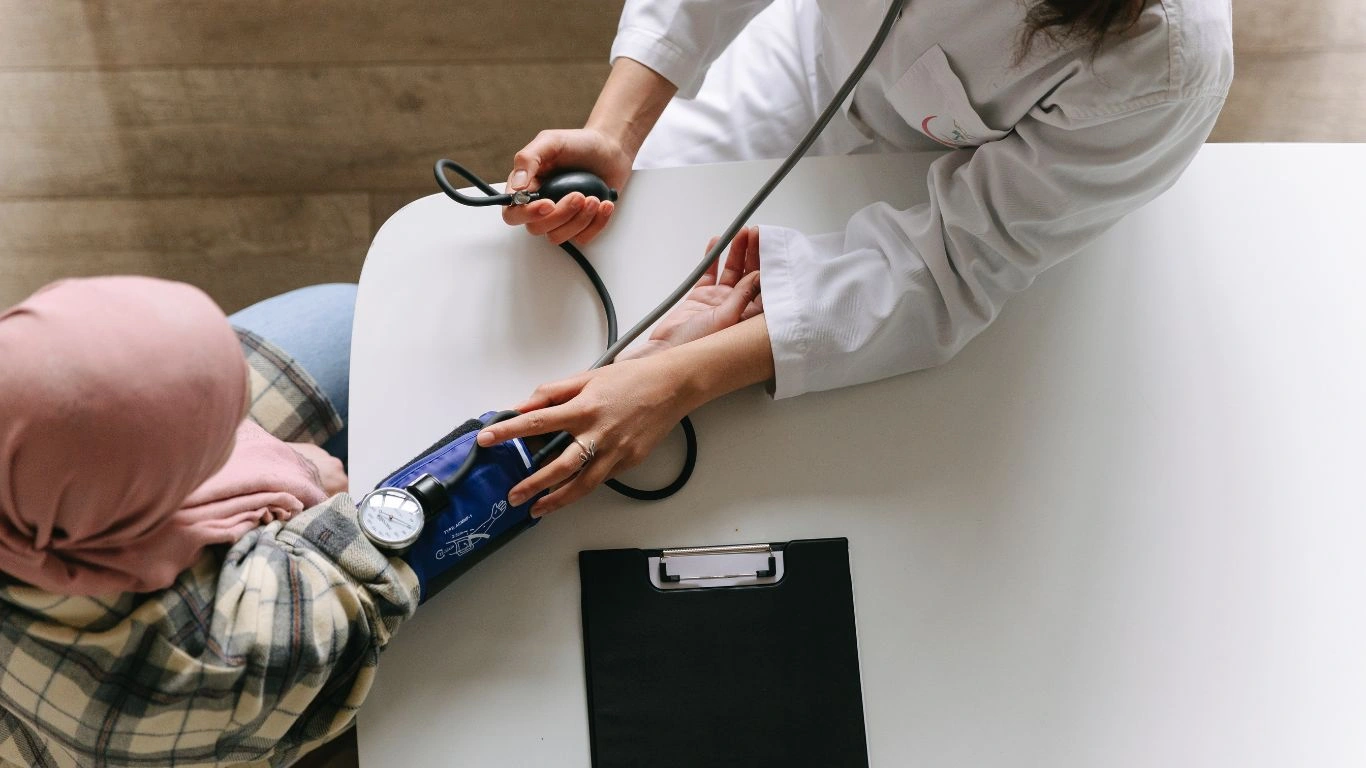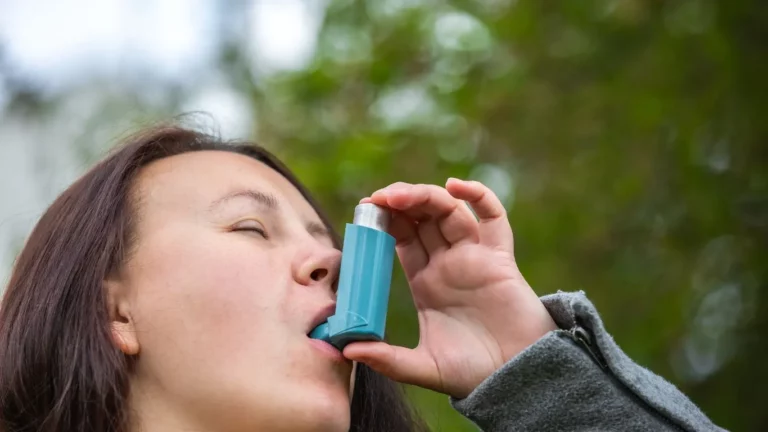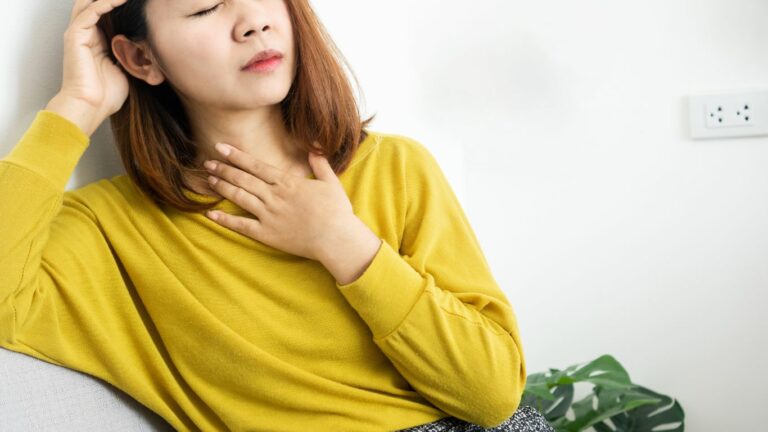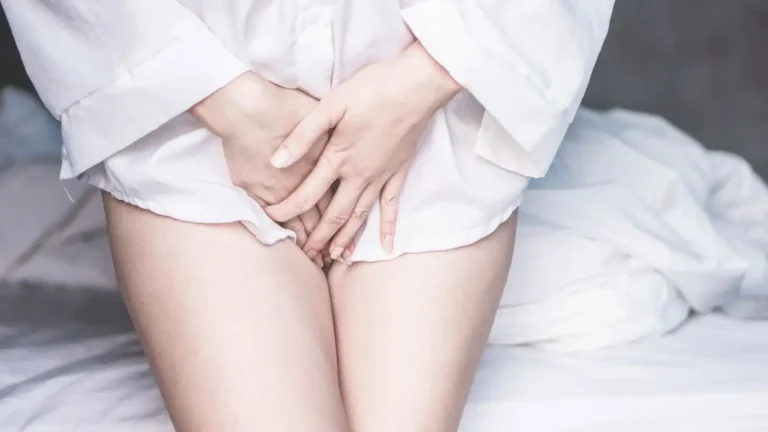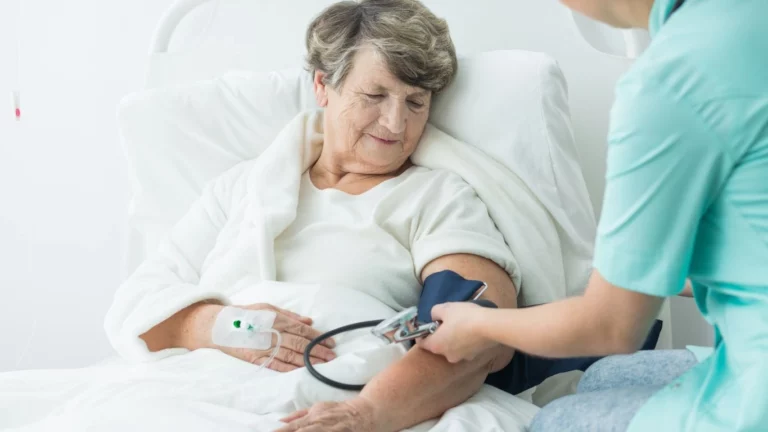Shocking Truth: Can High BP Cause Eye Twitching and How to Stop It
Can high BP cause eye twitching? That’s a question I never thought I’d be asked as often as I am, especially in clinic. But here we are. And honestly, I get it—when something as odd and annoying as an eyelid twitch pops up, it’s natural to start playing medical detective. As an internal medicine physician who spends a lot of time helping people get their blood pressure under control, I’ve had more than a few patients sit across from me wondering if their twitching eye might be their body’s quirky way of sending a warning signal. Let’s talk about it.
Understanding the Link Between Blood Pressure and Eye Twitching
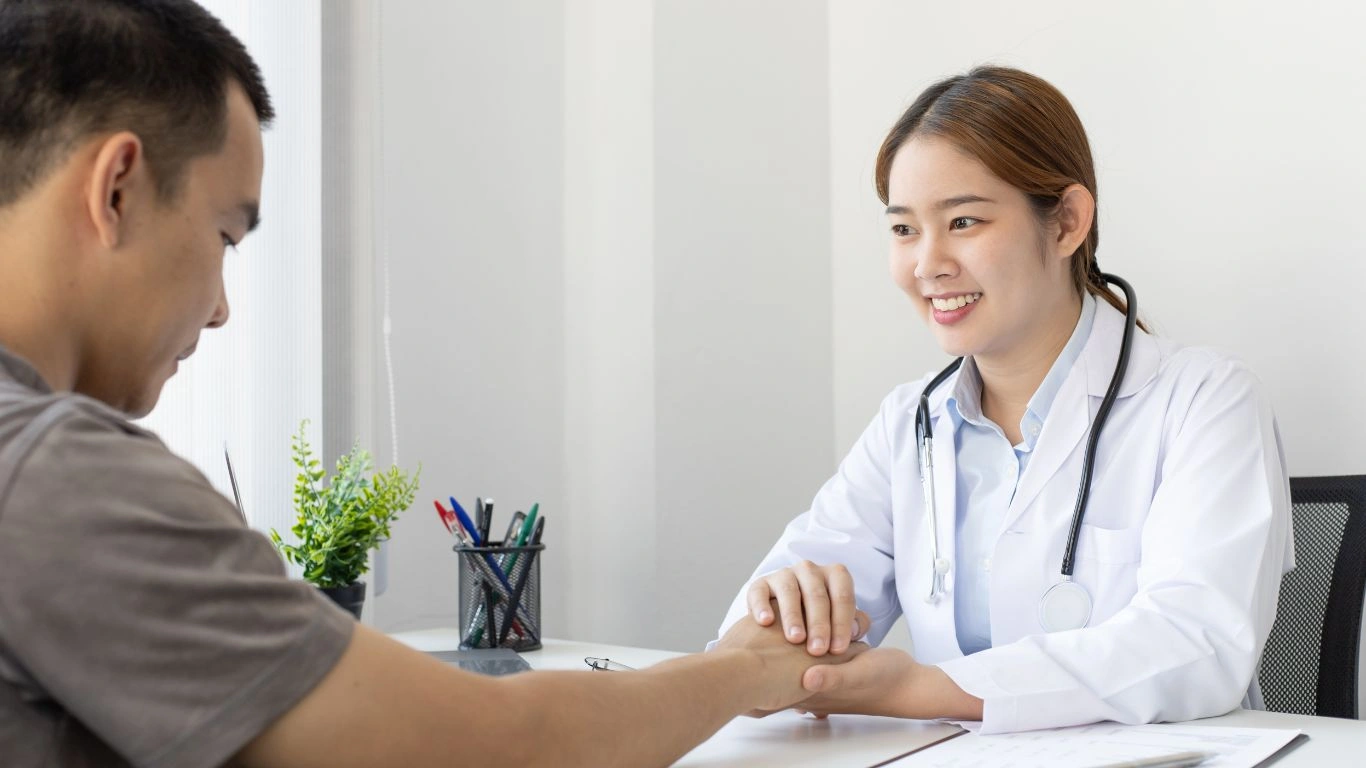
So first off—let’s clear something up. High blood pressure, or hypertension, doesn’t directly *cause* eye twitching in the majority of cases. But—and this is where it gets interesting—there are some indirect connections that make it worth paying attention to.
What Is Eye Twitching, Anyway?
Eye twitching, or what we medically call myokymia, is usually a harmless, repetitive spasm of the eyelid muscles. It’s often triggered by everyday things like:
- Lack of sleep (I see you, night-shifters and new parents)
- Too much caffeine (guilty… hello third cup of coffee)
- Stress (yep, the big one)
- Eye strain or dry eyes (especially from screen time)
Most of the time, it’s more of a nuisance than a sign of something serious. But if it keeps happening, it’s definitely worth digging a little deeper—especially if you’re also managing hypertension.
How Stress, High BP, and Twitching Are All Connected
Here’s the thing: stress is a common factor in all three. Chronic stress can push your blood pressure up and, no surprise, make your eyelid twitch like it’s doing a little angry dance. I’ve had patients who came in more worried about the twitching than the actual numbers on their BP monitor!
And it makes sense. When your body is in “fight or flight” mode, your nervous system is on high alert. Muscles can tense up, including the small ones around your eyes. Pair that with elevated blood pressure and it becomes this perfect storm of minor—but very irritating—symptoms.
Hypertension’s Hidden Symptoms Aren’t Always Obvious
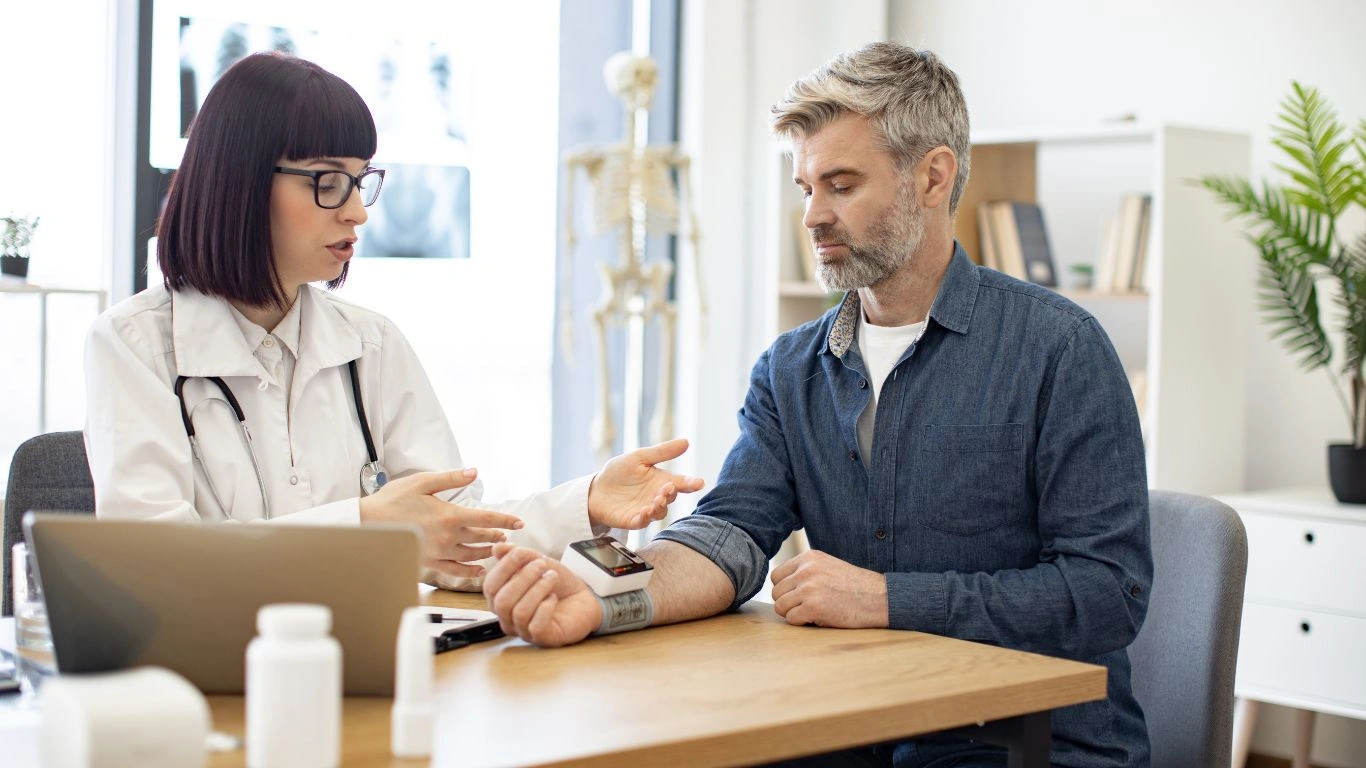
High blood pressure is known as the “silent killer” for a reason—it often doesn’t show symptoms until it’s done some real damage. That said, some people do experience subtle signs that something’s off. I’ve had patients tell me things like:
- “I keep getting this fluttering in my eye, and I feel more tired lately.”
- “I’m waking up with dull headaches and my vision feels a little blurry.”
- “My heart feels like it’s racing, and my eyelid won’t stop twitching.”
Now, these symptoms alone don’t confirm high blood pressure, but they do raise a red flag—especially when they’re popping up together. Eye twitching might be your body’s way of saying, “Hey, something’s going on—check under the hood.”
Can High BP Affect the Eyes in More Serious Ways?
Absolutely. This is where we step away from twitching and into the territory of actual eye damage. Over time, uncontrolled hypertension can lead to:
- Hypertensive retinopathy – changes in the retina’s blood vessels
- Choroidopathy – fluid buildup under the retina, leading to distorted vision
- Optic neuropathy – damage to the optic nerve, potentially causing vision loss
These are not twitchy-eye problems. These are serious, vision-threatening complications that tend to show up when blood pressure has been left too high for too long. In clinic, when I catch early signs of hypertensive retinopathy during a routine eye check, it’s a big wake-up call for patients—and often the first time they realize their blood pressure needs attention, fast.
So, Can High BP Cause Eye Twitching or Not?
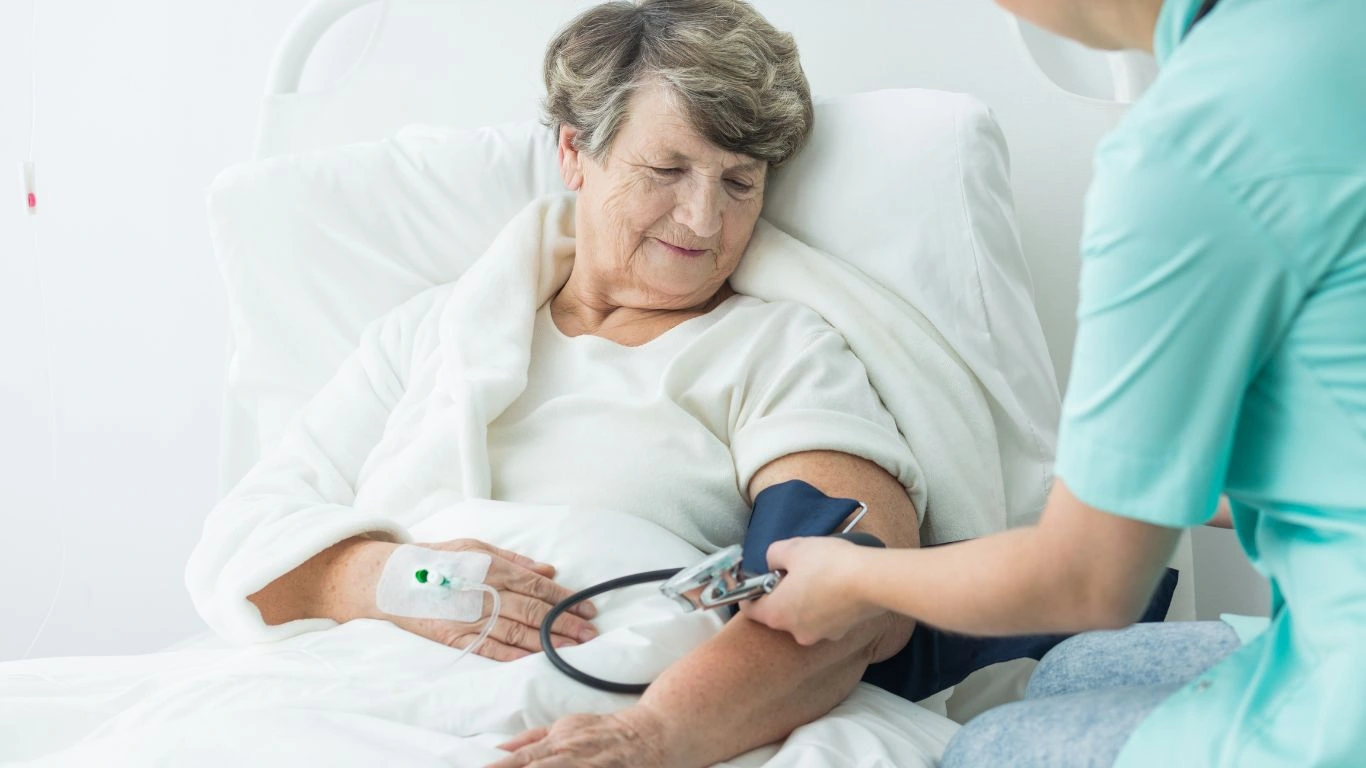
In short: not directly, but don’t ignore it. If you’ve been wondering “can high BP cause eye twitching?”—it’s not a simple yes or no. Eye twitching isn’t a typical sign of hypertension, but it could be a stress-induced symptom related to your lifestyle, which is definitely tied to your blood pressure.
In my own experience, when patients take the time to look at the bigger picture—stress levels, sleep habits, screen time, and blood pressure management—they usually start seeing the twitch calm down. It’s rarely one thing; it’s often a combination of things that adds up.
How Lifestyle Habits Link Eye Twitching and High Blood Pressure

Let’s talk about lifestyle—because honestly, this is where I see the biggest overlap between people struggling with high blood pressure and that relentless, annoying eye twitch. I’ve had patients come in with one goal (“Doc, make the twitch stop!”), and we end up talking about everything from their sleep schedule to their stress levels at work.
Here’s what’s wild: a lot of folks with high blood pressure are also burning the candle at both ends. And that lifestyle? It’s practically an invitation for your eyelid to start doing the cha-cha.
Sleep Deprivation: The Sneaky Culprit
One patient of mine, let’s call her Maria, was a night nurse working back-to-back shifts. She had borderline hypertension and her left eye had been twitching non-stop for weeks. Turned out, she was averaging 4 hours of sleep a night. Once she prioritized rest and bumped that up to at least 6–7 hours, her twitching magically disappeared. Go figure.
Lack of sleep messes with everything—cortisol, adrenaline, your blood pressure… and yes, even your eyelids.
Screen Time & Digital Eye Strain
We’re all guilty of it. Hours in front of our laptops, phones, tablets—it adds up. And staring at screens for too long causes dry eyes and muscle fatigue. It doesn’t help that high BP can already compromise the tiny vessels feeding your eye muscles, so that extra strain? Not a great combo.
- Tip: Try the 20-20-20 rule—every 20 minutes, look 20 feet away for 20 seconds. Your eyes will thank you.
When to Take Eye Twitching Seriously

So while most twitching is harmless, there are definitely cases when I advise patients to follow up more seriously. Especially if there’s a history of high blood pressure in the mix. Here’s when to raise the red flag:
- The twitching lasts more than a few weeks without stopping
- It spreads to other parts of your face or involves both eyes
- There’s pain, swelling, or changes in vision
- You’re also dealing with new or worsening headaches
These symptoms could suggest something more neurologic—or even signs of complications from uncontrolled hypertension like optic nerve involvement. I always tell patients: trust your gut. If something feels off, let’s check it out sooner rather than later.
Managing Blood Pressure Naturally to Calm the Twitch

When someone asks me, “Can high BP cause eye twitching?” my follow-up is usually, “Tell me about your day-to-day.” Why? Because it gives me a full picture of what’s happening behind the scenes. And more often than not, it leads us to manageable lifestyle tweaks that help both the twitching and the pressure.
Practical Changes I Recommend in Clinic
Here are some simple but effective changes that have worked for my patients over the years:
- Cut back on caffeine: It’s a known trigger for both twitching and elevated BP. Try substituting with herbal tea or decaf options if you’re drinking multiple cups a day.
- Practice mindful stress reduction: Whether it’s yoga, deep breathing, or journaling—anything that gives your nervous system a break helps lower pressure and calm muscles.
- Eat potassium-rich foods: Think bananas, spinach, sweet potatoes—these help balance sodium and lower blood pressure naturally.
- Hydrate: Dehydration can cause muscle cramps and twitching, plus it makes your body work harder to regulate pressure.
And hey—if you’re on medication for hypertension, be consistent. Skipping doses or taking them “only when I feel high BP” (yes, I’ve heard that a lot) won’t keep things steady, and may just be setting you up for more symptoms like twitching or worse.
Don’t Dismiss Your Body’s Signals
Look, I know an eye twitch doesn’t feel like a big deal. But sometimes it’s your body’s early alert system. And if you already have high blood pressure or a family history of it, I’d argue it’s worth listening to.
One thing I’ve learned in practice is that our bodies are always talking to us—it’s just a matter of whether we’re tuning in. Sometimes that twitch is saying, “Put the coffee down.” Other times it’s screaming, “Check your BP!”
When to See a Doctor About Eye Twitching and High Blood Pressure

From my years working in internal medicine and hypertension management, I can tell you that most eye twitches don’t require a trip to the ER or urgent care. But knowing when to seek medical advice can save you from unnecessary worry—and catch any hidden problems early.
Here’s when I tell my patients it’s time to get checked out:
- If the twitching is persistent—lasting several weeks without improvement despite rest and lifestyle changes.
- If the twitch spreads beyond the eyelid and affects other facial muscles.
- If you experience sudden vision changes, eye pain, or swelling along with twitching.
- If you notice any neurological symptoms like weakness, numbness, or difficulty speaking.
- And of course, if you have high blood pressure and are not yet under regular medical care for it.
When these red flags show up, it’s not just about the twitch anymore. It’s about making sure nothing more serious, like hypertensive retinopathy or a neurological issue, is going on. In my clinic, these signs prompt me to recommend a thorough eye exam and sometimes imaging tests to get a clearer picture.
How I Approach Hypertension and Eye Symptoms in Practice
When a patient walks in concerned about eye twitching and high blood pressure, my approach is pretty straightforward but comprehensive. We start by:
- Reviewing their full medical history and current medications (some meds can cause twitching).
- Checking blood pressure readings carefully, both in-office and sometimes via home monitoring.
- Asking detailed questions about lifestyle factors—stress, caffeine intake, sleep habits.
- Performing a focused physical exam, including an eye inspection.
- Referring to an ophthalmologist if there are any concerning eye findings.
This step-by-step helps me separate simple, benign causes from more serious ones, and it’s worked well for keeping patients informed and empowered about their health.
Proactive Tips to Keep Both Your Blood Pressure and Eyes Healthy

If you’ve made it this far, you’re probably wondering what you can do right now to prevent eye twitching and keep your blood pressure in check. Here are some things I often share with patients that really help:
1. Prioritize Regular Check-Ups
Blood pressure can fluctuate, and sometimes it sneaks up without obvious symptoms. Having regular check-ups ensures that any issues are caught early before they cause damage to your eyes or other organs. Plus, it gives you a chance to ask questions and adjust treatment plans as needed.
2. Manage Stress with Intent
Stress management is more than a buzzword. When I coach patients, we work on identifying their biggest stress triggers and then develop realistic coping strategies. Meditation, short walks, even just unplugging from devices for a bit—all of these can lower both blood pressure and muscle tension.
3. Keep an Eye on Your Diet
Eating heart-healthy foods doesn’t just benefit your cardiovascular system; it supports eye health, too. Foods rich in antioxidants, vitamins A, C, and E, and omega-3 fatty acids have protective effects on your vision. I encourage patients to think about colorful fruits, leafy greens, nuts, and fish as staples rather than treats.
4. Stay Active, But Don’t Overdo It
Physical activity helps regulate blood pressure and reduce stress, but over-exertion or intense workouts without proper hydration can sometimes trigger eye twitching. A balanced approach with moderate exercise is key—think brisk walks, swimming, or yoga.
5. Limit Screen Time and Practice Eye Care
As I mentioned before, the 20-20-20 rule is a lifesaver in this digital age. Additionally, using artificial tears or lubricating eye drops can reduce dryness-related twitching.
Wrapping Up the Eye Twitch and High Blood Pressure Connection
From my clinical experience, eye twitching itself rarely signals dangerously high blood pressure, but it shouldn’t be dismissed, especially if you’re dealing with hypertension or its risk factors. It’s often a sign pointing toward lifestyle factors that, when addressed, improve both your blood pressure and your overall comfort.
If you’re seeing your eyelid do a little dance more often than not, consider this your nudge to check in on your health habits—and if you’re unsure, don’t hesitate to talk to a healthcare provider. Early attention and simple tweaks can make a big difference.
References
- American Heart Association
- American Academy of Ophthalmology
- Centers for Disease Control and Prevention (CDC) – Blood Pressure
- American Gastroenterological Association (for general E-E-A-T principles)
Disclaimer
This article is intended for informational purposes only and does not replace professional medical advice, diagnosis, or treatment. Always consult your healthcare provider with any questions you may have regarding a medical condition or symptoms.

Dr. Gwenna Aazee is a board-certified Internal Medicine Physician with a special focus on hypertension management, chronic disease prevention, and patient education. With years of experience in both clinical practice and medical writing, she’s passionate about turning evidence-based medicine into accessible, actionable advice. Through her work at Healthusias.com, Dr. Aazee empowers readers to take charge of their health with confidence and clarity. Off the clock, she enjoys deep dives into nutrition research, long walks with her rescue pup, and simplifying medical jargon one article at a time.

